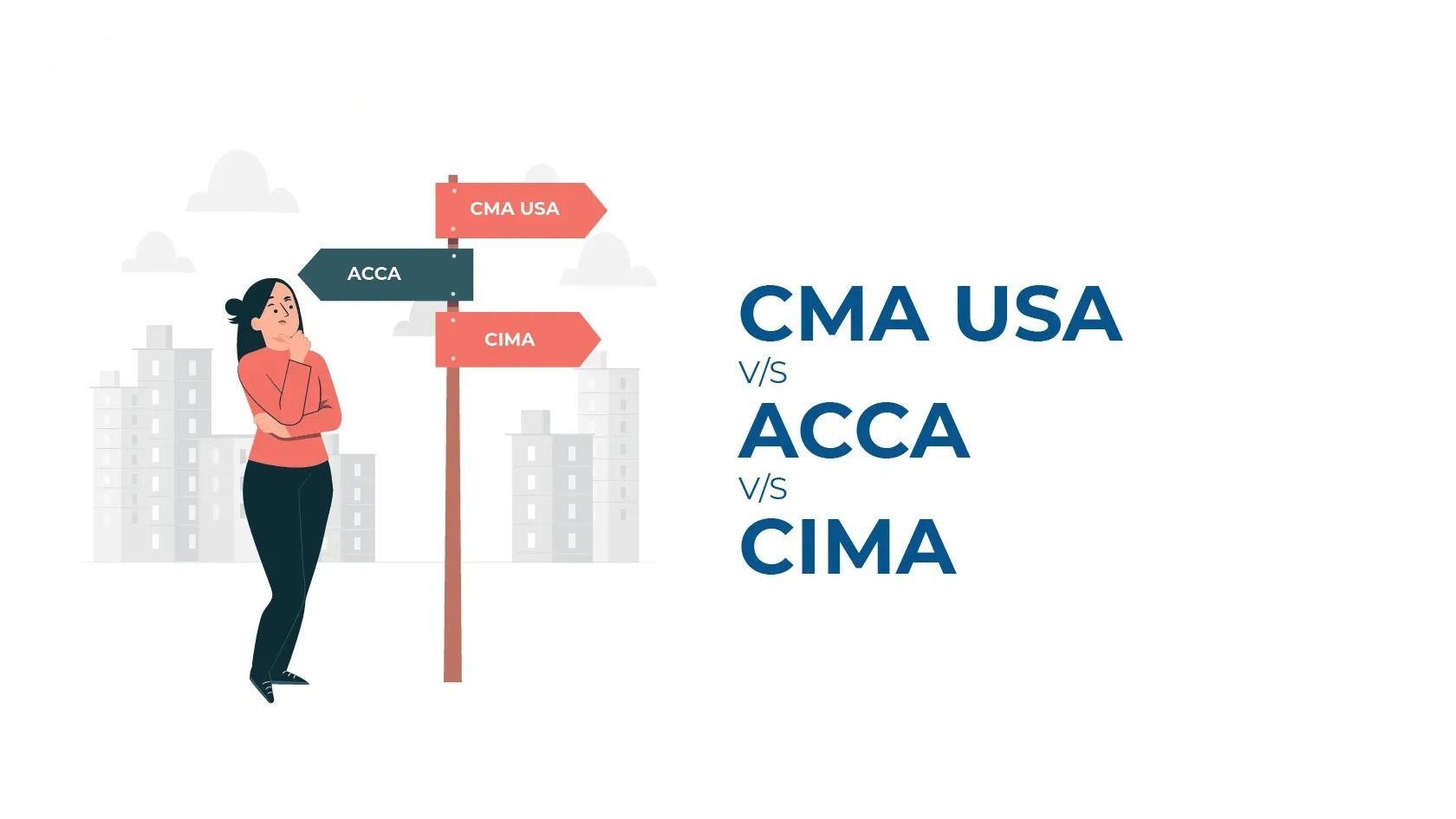Are you looking to boost your career in finance and accounting? Selecting the right professional course can make a difference, but it can feel overwhelming. The globally recognized designations, CMA, ACCA and CFA, each open doors to demanding career opportunities. Whether in corporate finance, investment banking, accounting, or strategic management, we will guide you in deciding the best plan, depending on your interests, career objectives, and industry preferences.
The Certified Management Accountant course is regarded as a foundational course in management accounting and decision-making. ACCA offers a foundation in audit, taxation and accounting – a flexible option for an international career. While the CFA is the standard course for financial analysis and investment management, it also offers options in asset management, portfolio management, and equities research. It is essential to determine scope, international acceptance and opportunity set before deciding the right pathway that aligns to your future.
Overview of CMA Course
- Institution: The Certified Management Accountant course is provided by the Institute of Management Accountants (IMA), based in the USA.
- Focus Areas: The program focuses on management accounting, performance management, corporate finance, strategic decision-making, and internal controls, providing professionals with the necessary skills to successfully hold leadership roles in the finance world.
- Time to Certification: This course typically takes 12 to 18 months to complete, depending on the individual candidate’s preparation style, learning pace, and examination capabilities.
- Eligibility: To be eligible for the course, a candidate must have a bachelor’s degree from an accredited university and a minimum of two years of experience with financial management and management accounting.
What is ACCA Certification?
- Issued By: The ACCA course is officially issued by the Association of Chartered Accountants (ACCA), based in the United Kingdom. ACCA is a well-known certification that is internationally respected.
- Focus Areas: The ACCA course encompasses a broad range of topics, including audit, finance, accounting, corporate law, taxation, and management accounting. The syllabus enables degrees of expertise that extend beyond technical accounting to prepare for a variety of roles in the field of finance and business leadership.
- Course Duration: The ACCA takes between 2 and 3 years to complete, depending on past education and exemptions granted.
- Entry Criteria: To begin the ACCA journey, candidates must have completed 10+2, with English and Mathematics being the key subjects, demonstrating a basic understanding of numeracy and the ability to communicate effectively. Graduates in finance, commerce, or other relevant disciplines will qualify for exemptions based on specific papers.
Understanding CFA Certification
- Official Institution: In the United States, the CFA Institute provides the Chartered Financial Analyst (CFA) curriculum. It is an internationally recognized professional body for investment and financial professionals worldwide.
- Focus Areas: The CFA program provides in-depth study of investment management, financial markets, portfolio analysis, and equity research. These topics prepare candidates to base financial and investment decisions on facts.
- Course Duration: The typical duration for the CFA certification is approximately 3-4 years, as the CFA program can be completed at the individual candidate’s pace, allowing them to study at their own speed for each of the three levels.
- Eligibility Requirements: Candidates must have a bachelor’s degree or be in their final year of a bachelor’s degree program to enrol, which enables students to pursue a career emphasis.
CMA vs ACCA vs CFA: Determining Career Prospects
1. Certified Management Accountant
A) Career Opportunities
CMA professionals are sought after in the management accounting, FP&A (Financial Planning and Analysis), Corporate Finance, Internal Auditing and Strategic Management roles. You can secure positions such as Financial Analyst, Finance Manager, Business Controller, and CFO in multinational companies.
B) Salary Growth
Certified Management Accountant holders earn 30 to 40% higher salaries than non-certified professionals. In the US, average salaries range from $80,000 to $120,000 per annum, while in the Middle East and Asia, pay is lucrative than local standards. With adequate experience, professionals can advance to senior roles, accompanied by significant compensation.
C) Future Scope
Certified Management Accountants are recognized for strategic and decision-making skills. They have robust growth potential in multinational organizations and leadership roles. However, demand is expected to continue rising in finance and corporate management internationally.
2. ACCA (Association of Chartered Certified Accountants)
A) Career Opportunities
ACCA members generally have a wide range of career options that cover accounting, auditing, risk management, taxation and consulting. They can work for multinational companies, Big 4 firms, and financial institutions worldwide. They can take on roles such as Auditor, Finance Manager, Risk Analyst, and Tax Consultant.
B) Salary Growth
ACCA members can expect entry-level salaries to be low, but salaries do increase depending on specialization, experience, etc. In the UK, average salaries for mid-level roles range from £30,000 to £55,000 per annum; senior roles, such as Finance Director, could earn £100,000 or more.
C) Future Scope
ACCA offers global mobility and flexibility across audit, accounting and taxation roles. Experienced professionals are usually sought after in multinational businesses and emerging markets. In addition, increasing regulatory and compliance obligations will provide long-term relevance.
3. CFA (Chartered Financial Analyst)
A) Career Opportunities
CFA is the typical route for positions that involve investment management, portfolio management, financial or equity research, and financial analysis. CFAs can work in investment banks, asset management companies, hedge funds, and private equity. You can obtain positions such as Portfolio Manager, Investment Banker, Equity Analyst, and Risk Manager.
B) Salary Growth
Individuals with a CFA can enjoy strong salary packages due to their specialized knowledge. In the US, average earnings are between $100,000 and $150,000, but compensation will be much higher for work in the financial centres of New York, London, Singapore, and Hong Kong. Meanwhile, Senior Portfolio Managers and Investment bankers can expect. Earnings of $200,00 plus bonuses.
C) Future Scope
CFA holders are valued in the investment management and financial analysis across the globe. Demand for these professionals will grow with the rise of international financial markets and wealth management services. This approach provides robust job security and opportunities for salary growth to professionals.
Conclusion
Selecting between CMA, ACCA and CFA relies on career goals. Certified Management Accountant is advantageous for those with management accounting and corporate finance objectives. The ACCA is ideal for aspiring accountants and auditors seeking global opportunities. The CFA course is well-suited for professionals seeking to advance their careers in investment management and financial analysis.
Each course provides robust growth and competitive salaries! To hence acquire a rewarding career path in the long run, select a course aligned with your career objectives and interests. To learn more about the Certified Management Accountant course, contact Zell Education experts right away!
FAQs
1. Which course is ideal for finance management roles?
The Certified Management Accountant program is ideal for management accountants and professionals in corporate finance positions worldwide.
2. Which certification has more salary opportunities?
The American CMA and CFA provide for more highly paid positions, based on industry and location.
3. Can I transition industries with these certifications?
The USA CMA and ACCA have accounting and finance flexibility across the world, while the CFA is more focused on investments.




